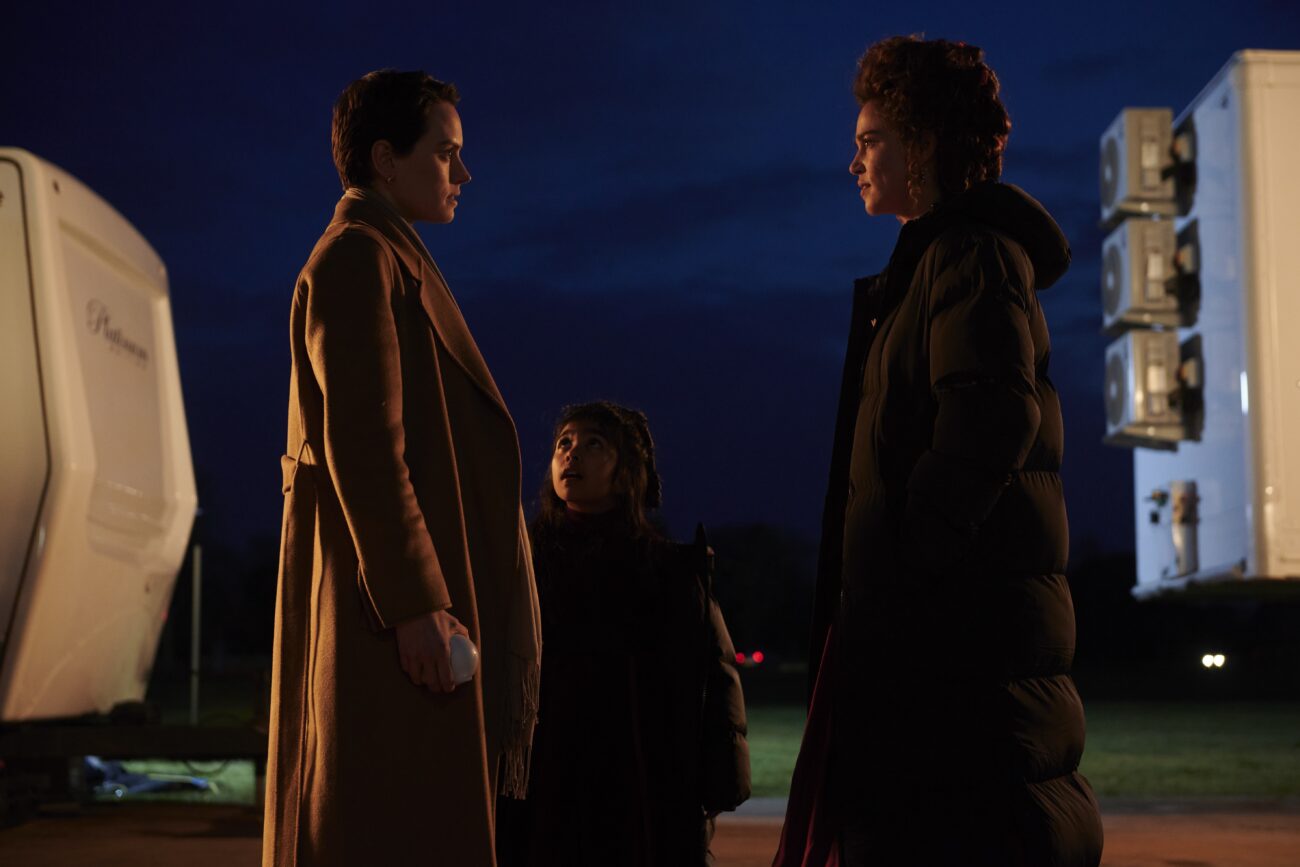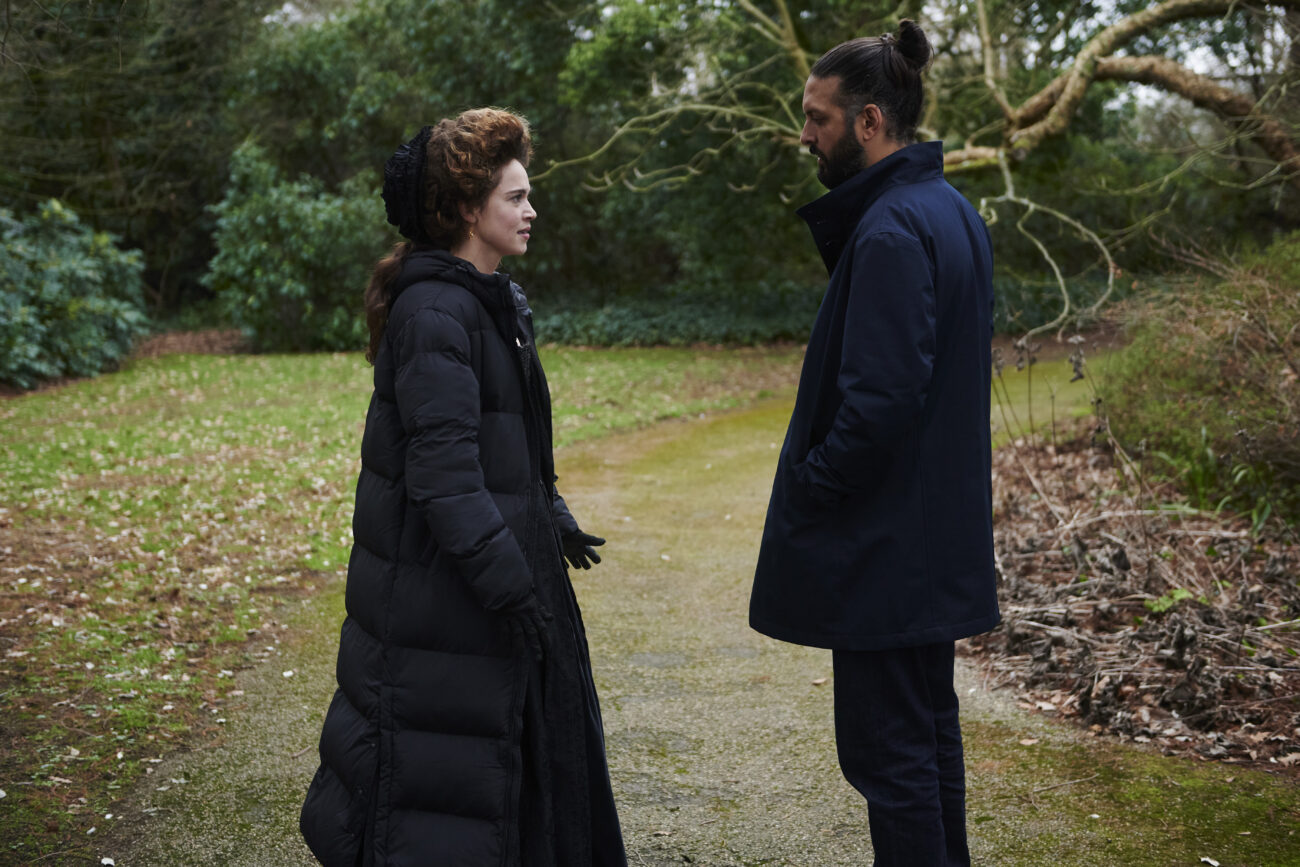Actor Tom Bateman arrives as a writer with a twisty thriller whose story was conceived by his wife – and the film’s star – Daisy Ridley.
By Danny Munso
Tom Bateman has been obsessed with story from a young age. He parlayed that love into a successful career as an actor but always harbored a desire to be a writer. Not that he told anyone that for the longest time. “I’ve always written, I just never really shared it with people,” he laughs. “I just wrote little stories or plays and I never wanted to share them with anyone.” That is until he met his wife—actor Daisy Ridley—when they both co-starred in 2017’s Murder on the Orient Express. “I remember quite early on in our relationship, she saw me writing away and I said oh, I’m writing this story about this thing that happened to my mom,” he continues. “Daisy read it and she doesn’t bullshit. She turned to me and said ‘this is really good, Tom. I think you should do something with this.’ So she’s the one that gave me the confidence that maybe this is something I could do.”
Since Ridley’s support was so crucial to Bateman pursuing a career as a writer, it’s perhaps fitting that his first screenwriting credit is on Magpie, a brilliant, twisty thriller whose story was conceived by Ridley herself. After wrapping up filming on 2023’s The Marsh King’s Daughter, Ridley was on a flight home when she started thinking about the way that child actor Joey Carson, who played Ridley’s daughter in the film, kept referring to Ridley as “mom” on set. That got Ridley’s wheels turning and she thought of an idea for a film where an actress gets too attached to the child playing her daughter in a film and the child’s father who chaperones her on set. Ridley told the idea to Bateman when she got home and said she thought this is a story they could produce together and that he should be the one to write it. “What interested me about it was the idea of what is real and what is not real?” he recalls. “What we perceive to be real. What is a relationship and if you believe it’s real, is it real? This little girl she was on set with kept calling her mom and for her it was real in that moment. For me, I thought that’s a super interesting area to explore. I also just liked the juicy drama of usurping a sacred institution like a family. It’s almost like Fatal Attraction but from the woman’s point of view. Getting in there and cracking that open. It’s so timeless and relatable and there’s so much to explore so I thought as a writer there was so much material there.”

As Bateman got halfway through the script, he began to feel a pull from one of the characters. While the original idea was to be centered on the actress—Alicia—seducing the child actor’s dad—Ben—on set, Bateman found himself drawn to what was going on with Anette, Ben’s wife. “If you’re writing an action, you have to write the reaction, right?” Bateman says. “The action of the story was this woman seducing this guy and trying to make the daughter think she’s the mother. So when I was writing the reaction of that, there’s this woman at home and I kept going who is this woman? She’s left at home with a baby and has a front row seat to her husband undermining what they’ve built for all these years. I thought what is all that pressure doing to this incredible woman who’s getting crushed and crushed?” Bateman told Ridley that Anette was drawing his attention as a writer and she encouraged him to chase that angle. “She said follow it and see what happens and once I did that, it was like stepping into a fast-running river,” he continues. “The current just took me as soon as I swung the focus. It became Anette’s story and from there, it almost wrote itself.” Ridley clearly liked the change as well since after seeing what Bateman was writing, she decided to play Anette herself. That’s how Magpie became a story about Anette (Ridley) having to stay at home with a newborn baby as her author husband Ben (Shazad Latif) chaperones their daughter Matilda (Hiba Ahmed) to the set where she has been cast in a film. There Ben becomes infatuated with Alicia (Matilda Lutz), the actor who is playing Matilda’s mother in the film.
Without giving all of Magpie’s secrets away, the change Bateman made to focus the film more on Anette allowed him to find a deeper version of the psychological thriller he always intended to write by using the narrative to play with the audience’s perceptions of who the three main characters are and what their true intentions may or may not be. “As an actor, I’ve always been interested in the character and the drive and the motivation and this allowed me to write a set of characters where an audience thinks they know who they are but then we subvert that on every level,” he explains. “The story became about, for me, overlooking and underestimating characters and what you perceive them to be compared to what they actually are. You think you know who Ben is but he’s not that guy. You think you know who this movie star is—this other woman—she’s not. You think you know who this down beaten, put-upon mother is. She’s not that. She has power and strength in her you don’t see coming. For me, that gave me a whole arsenal to play with as a creative writer.
As the narrative unfolds, the audience is shown two points of view: Ben’s growing infatuation with Alicia on set and Anette’s slow-building suspicion of that and her reaction. Within those storylines, Bateman’s writing allows the viewer to come to conclusions about both individuals as well as their marriage. And depending on how you view those events, you may start to take sides. This is what Bateman and the filmmakers want. One scene will show Anette meeting up with her old boss in the hopes of getting her job in publishing back and failing miserably. It’s easy to sympathize with her plight, particularly since she has to drag her crying baby to the meeting. But in the next, we hear a version of events from Ben that hints that perhaps Anette is not as psychologically stable as we first think she is. Because of this complicated narrative weaving, Bateman organized this new version of the script by using color-coded post it notes to track everything that was happening both on and off screen. “There were notes for what the story actually was plus what we think is happening and then what’s actually happening,” he explains. “It had to be dramatic as possible but I was very adamant we couldn’t cheat. We couldn’t lie to the audience and not show them things. It all had to be there and have it all still work after you find out what’s really going on.”

One of the strongest elements of Bateman’s script is what it doesn’t tell the audience. In the dueling perspectives we see, there are hints of things in Anette and Ben’s past that are clearly informing the events of the film. Ben talks on multiple occasions of medication in Anette’s life. Then there’s a cryptic 8-month period referenced multiple times where Ben left their family. There are allusions made to things but nothing is ever spelled out for the audience. Though there were longer versions of the script where these things were far more explicit, Bateman used his experience as a performer to pare back the information we are given. “I’ve been in things as an actor where you are given all this exposition and I’m like fuck,” he laughs. “I’m of the belief that audiences are way smarter than we think. I think our ears as audience members are so fine-tuned that we don’t need a three course meal explaining who these people are and where they’re from. It can take the smallest thing. The eight months away, that one’s important and it’s repeated three times throughout the movie. But if I’m watching something and I’m presented with you went away for eight months and left me alone and I felt this and you left me and I know you were with someone else, for me the drama is gone. The drama lies in the unspoken and the unsaid and the masks we all put on to hold our insecurities together. All of these things are unsaid and when you have brilliant actors like we have, you don’t need much. And when you have a smart audience you don’t need much. My taste says strip back to as little as possible because how people actually communicate and what they actually say and what they actually hold back in real life – in my experience – is far sparser. People hold their cards closer to the vest.”
Bateman’s career as a writer is not a one and done. He has other scripts finished and some even set up with directors and actors already attached. Perhaps the best indicator that he’s a writer is the fact he still doesn’t quite feel like one, an emotion writers of any level can identify with. “I’m still struggling under the weight of imposter syndrome,” he laughs. “There’s nothing scarier than hitting the send button on a script. You’re basically saying here’s a part of myself. But the response I’ve got from it has been so amazing. Sitting in a screening room with 300 people watching something I’ve written is such an indescribable feeling. I love it and I’m going to keep doing it. It’s so scary but so rewarding when it works. There’s nothing like it.”
If you’d like to subscribe, feel free to use coupon code: SAVE5 to take $5 off your subscription and get instant access!
All you need to do is click here to subscribe!
There’s plenty more to explore in Backstory Magazine issue 53 you can see our table of contents right here.
Thanks as always for spreading the word and your support!